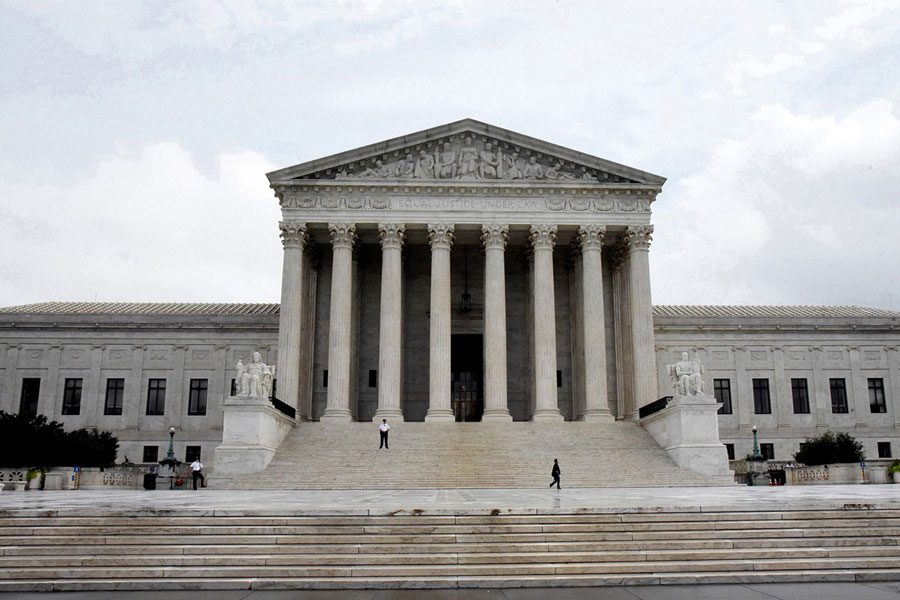Thuillier: Anti-LGBTQ+ discrimination in the workplace is an issue that needs to be addressed
The Supreme Court will hear cases in its next term to determine if a federal employment discrimination law banning discrimination based on sex also applies to sexual orientation and gender identity.
April 23, 2019
It is about time that the LGBTQ+ community is included in workplace discrimination protections. The Supreme Court will finally hear cases in its next term to determine if a federal employment discrimination law banning discrimination based on sex also applies to sexual orientation and gender identity.
Never mind that it has been a long time coming, it also comes on the heels of a couple of increasingly dangerous years for the LGBTQ+ community in the United States. It should be a fundamental right that employee discrimination laws extend to protect all those who are discriminated against, and that includes the LGBTQ+ community.
In its next term, the Supreme Court will take on three different cases that deal with the protections granted by Title VII of the Civil Rights Act, which protects people against discrimination based on their “sex, race, color, national origin, and religion.”
Two cases, Bostock v. Clayton and Altitude v. Zarda, deal with sexual discrimination, and the last case, R.G. and G.R. v. EEOC, focuses on gender identity. Those cases will come four years after the groundbreaking Obergefell v. Hodges in 2015, which legalized same-sex marriage nationwide.
However, a major factor will be the changed makeup of the Court, which has swung more conservative with the appointments of Justices Neil Gorsuch and Brett Kavanaugh, who replaced Justice Antonin Scalia after his death in 2016 and Justice Anthony Kennedy after his retirement in 2018, respectively. A conservative court seems unlikely to extend protections that are not explicitly stated in existing legislation, but failure to do so would exaggerate the growing target the LGBTQ+ community has on their backs.
Since gaining federal marriage equality in 2015, the LGBTQ+ community has been subject to more violence and arguably more scrutiny than before. 2017 saw a continued rise in anti-LGBTQ+ violence. According to the FBI, 17 percent of victims of hate crimes were targeted because of their sexual orientation or gender orientation. This threat that LGBTQ+ people are subject to extends into the workplace, where 30 states do not have laws explicitly protecting these workers against discrimination.
When over 6.5 million employees in the United States identify as LGBTQ+, according to the American Bar Association, it is a big deal that they face “widespread discrimination” according to nationwide surveys. About four percent of the American workforce is at risk of losing their jobs at any time based on their identity. Why isn’t more being done to protect those employees?
About 40 percent of countries in the world have comprehensive laws prohibiting discrimination based on sexual orientation and or gender identity. The United States is not one of them. An additional 12 percent of countries offer some sort of worker protection, usually against discrimination based on sexual orientation. Again, the United States is not one of them. Both Mexico and Canada offer full protection against discrimination for members of the LGBTQ+ community. The United States has to follow suit.
Extending protections to the LGBTQ+ community is not even such a novel or controversial idea to a majority of Americans: 67 percent of Americans support federal laws protecting transgender people from employment discrimination and 71 percent support protecting LGBTQ+ people from discrimination in housing, public accommodations and jobs.
The LGBTQ+ community needs these protections. Transgender people have a higher unemployment rate than the national average, according to data from Out & Equal workplace advocates. One in 10 LGBTQ+ employees have reported leaving a job because of the unwelcoming environment. Over half of LGBTQ+ employees report the negative impact that discrimination has on their work environment. All those numbers show the need for legislation and workplace protection.
The U.N. Human Rights Council affirmed the protection of equal rights for LGBTQ+ individuals in a statement in 2011, but the United States’ disregard for this document is going against the equal rights that the Human Rights Council stands for and that this country is theoretically founded on.
The Supreme Court taking up the three cases outlined above is a step forward in the battle that LGBTQ+ people wage to get equal rights. If change does not come from that — and the language of the Civil Rights Act makes that seem likely — it at least opens up the possibility of a change of legislation, backed by a majority of the population, to give the LGBTQ+ community equal protection against discrimination in the workplace. It is the right thing to do and would be a big step forward in achieving equality for all in all ways of life.
Marcus Thuillier is a first-year graduate student. He can be contacted at marcusthuillier2019@u.northwestern.edu. If you would like to respond publicly to this op-ed, send a Letter to the Editor to opinion@dailynorthwestern.com. The views expressed in this piece do not necessarily reflect the views of all staff members of The Daily Northwestern.



